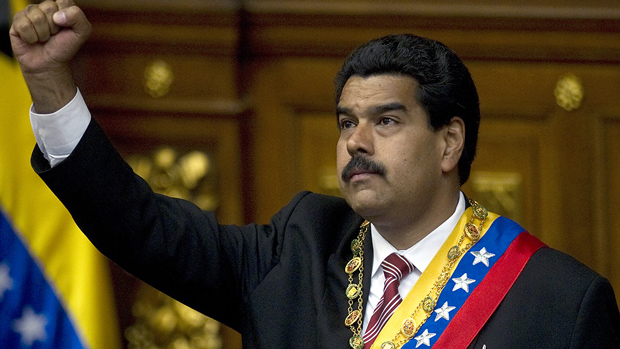Venezuela moves closer to dictatorship
Opposition claim coup after pro-Nicolas Maduro Supreme Court takes over powers of opposition-controlled congress

A free daily email with the biggest news stories of the day – and the best features from TheWeek.com
You are now subscribed
Your newsletter sign-up was successful
Venezuela's Supreme Court has dissolved the opposition-controlled National Assembly and taken over its powers, bringing the country a step further towards one-man rule under President Nicolas Maduro.
"The ruling effectively means the three branches of the Venezuelan government will be controlled by the ruling United Socialist Party," says CNN. "The opposition has been taken out of the picture."
Opposition politicians said it was a step towards dictatorship.
The Week
Escape your echo chamber. Get the facts behind the news, plus analysis from multiple perspectives.

Sign up for The Week's Free Newsletters
From our morning news briefing to a weekly Good News Newsletter, get the best of The Week delivered directly to your inbox.
From our morning news briefing to a weekly Good News Newsletter, get the best of The Week delivered directly to your inbox.
Julio Borges, president of the national assembly, said: "Nicolas Maduro has staged a coup d'etat. It's one thing to try and build a dictatorship and another to complete the circuit."
He added that "for the first time" Maduro "has all the power to enact laws, assign contracts, incur foreign debt and persecute fellow Venezuelans".
In response, Peru has recalled its ambassador to Caracas, saying it will increase efforts to have Venezuela removed from the Organisation of American States for what it called a "flagrant breach of democratic order".
The US also condemned what it described as a move to "usurp the powers" of the national assembly.
A free daily email with the biggest news stories of the day – and the best features from TheWeek.com
"This rupture of democratic and constitutional norms greatly damages Venezuela’s democratic institutions and denies the Venezuelan people the right to shape their country’s future through their elected representatives. We consider it a serious setback for democracy in Venezuela," said the US State Department.
The move "caps a year in which the last vestiges of Venezuela's democracy have been torn down… leaving what many now describe as not just an authoritarian regime, but an outright dictatorship", the New York Times says.
Maduro lost control of congress in December 2015, after voters "angry about soaring inflation, rising poverty and shortages of medicines and basic commodities" turned on his United Socialist Party of Venezuela, says The Guardian.
Since then, adds the paper, relations between the administration and the legislature "have been stuck between tension and conflict".
-
 Why is the Trump administration talking about ‘Western civilization’?
Why is the Trump administration talking about ‘Western civilization’?Talking Points Rubio says Europe, US bonded by religion and ancestry
-
 Quentin Deranque: a student’s death energizes the French far right
Quentin Deranque: a student’s death energizes the French far rightIN THE SPOTLIGHT Reactions to the violent killing of an ultraconservative activist offer a glimpse at the culture wars roiling France ahead of next year’s elections
-
 Secured vs. unsecured loans: how do they differ and which is better?
Secured vs. unsecured loans: how do they differ and which is better?the explainer They are distinguished by the level of risk and the inclusion of collateral
-
 Epstein files topple law CEO, roil UK government
Epstein files topple law CEO, roil UK governmentSpeed Read Peter Mandelson, Britain’s former ambassador to the US, is caught up in the scandal
-
 Iran and US prepare to meet after skirmishes
Iran and US prepare to meet after skirmishesSpeed Read The incident comes amid heightened tensions in the Middle East
-
 Israel retrieves final hostage’s body from Gaza
Israel retrieves final hostage’s body from GazaSpeed Read The 24-year-old police officer was killed during the initial Hamas attack
-
 China’s Xi targets top general in growing purge
China’s Xi targets top general in growing purgeSpeed Read Zhang Youxia is being investigated over ‘grave violations’ of the law
-
 Panama and Canada are negotiating over a crucial copper mine
Panama and Canada are negotiating over a crucial copper mineIn the Spotlight Panama is set to make a final decision on the mine this summer
-
 How oil tankers have been weaponised
How oil tankers have been weaponisedThe Explainer The seizure of a Russian tanker in the Atlantic last week has drawn attention to the country’s clandestine shipping network
-
 Why Greenland’s natural resources are nearly impossible to mine
Why Greenland’s natural resources are nearly impossible to mineThe Explainer The country’s natural landscape makes the task extremely difficult
-
 Iran cuts internet as protests escalate
Iran cuts internet as protests escalateSpeed Reada Government buildings across the country have been set on fire